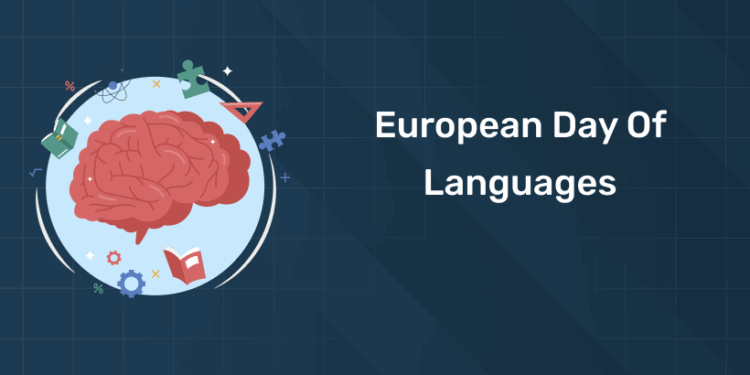Table of Contents
The European day of language is celebrated every year on 26th September. The European day of language as the name suggests is a celebration and acceptance of all varieties of the European language. It is important to understand the essence of each language. This day can help the people to celebrate the linguistic enrichment of Europe. Language is an essential aspect of human relationships. Language is the medium of communication. It can represent a place, country, continent and also the culture of the particular group.
The celebration of the diversity of the language along with the culture is the main theme of the day. Within Europe diverse language varieties are available, it is necessary to understand the value and importance of each language in use. The European day of language is in other words, the celebration of the language itself. The essence and importance of language in maintaining stability in human life are worth noting.
This year, it is going to be the seventh year of celebration of the European day of language. This day was first celebrated in 2002. The European year of language had started to be observed from 2001. The European Union and the council of Europe collaborated and joined hands to celebrate this day. This day is celebrated officially to acknowledge the importance of the language across the globe. The European language should be accepted in its variant colors. It is only possible if many people are aware of the significance of the day. The European day of language is a celebration of the language variety existing within Europe.
European Day of Languages 2025 Date – September 26
In this article readers can get a glimpse on
- History and Objective of European Day of Languages
- European Day of Languages Theme 2025
- European Day of Languages Quiz
History and Objective of European Day of Languages
1: Who was the first woman President of India?
The European Day of Languages was first celebrated in 2001, marking the European Year of Languages organized by the Council of Europe and the European Union. After its success, the Council of Europe declared that September 26 would be celebrated annually. Since then, the day has been observed across 46 member states of the Council. It was created to honor Europe’s rich linguistic heritage and to encourage language learning. Over the years, it has grown into a platform for schools, institutions, and communities to celebrate multilingualism.
The main objective of the day is to promote linguistic and cultural diversity. It encourages people to learn more than one language, which helps improve communication and cross-cultural understanding. The day also spreads awareness about the importance of preserving regional and minority languages. It aims to make language learning accessible and enjoyable for people of all ages. Ultimately, it supports the idea that knowing multiple languages strengthens unity and cooperation in Europe.
Free UPSKILLING Courses!
Take your first step toward mastering in-demand skills, acing interviews, and securing top-tier jobs with Entri's free upskilling courses.
Start Learning!European Day of Languages Theme 2025
The theme for the European Day of Languages in 2025 is “Languages open hearts and minds.”
This theme highlights the profound impact of learning languages beyond just communication. It emphasizes how languages act as a bridge, fostering empathy, connection, and a deeper understanding of diverse cultures.
The phrase “open hearts” refers to the emotional and social benefits of language learning. It’s about building genuine relationships, connecting with people on a more personal level, and breaking down cultural barriers. When you make an effort to speak someone’s language, it’s a sign of respect that can lead to stronger friendships and a more inclusive community.
The “open minds” aspect focuses on the cognitive and intellectual advantages. Learning a new language challenges your brain, improving memory, problem-solving skills, and mental flexibility. It also broadens your perspective, allowing you to see the world through a new lens and appreciate different ways of thinking.
In essence, the 2025 theme celebrates the idea that languages are not just a tool for business or travel, but a powerful force for personal growth and global unity.
European Day of Languages Previous Themes
The European Day of Languages, celebrated annually on September 26, was established in 2001 by the Council of Europe. The day aims to promote the rich linguistic and cultural diversity of Europe and encourage people of all ages to learn languages. While there isn’t a single, consistently worded theme from a central body like the UN, the Council of Europe and its partners often highlight a specific message or motto each year.
Here are the themes and primary focuses from recent years:
- 2015: “Take your time don’t risk your life!” (This was an error from a previous search result). A more general focus was on promoting linguistic diversity and lifelong language learning.
- 2016: Focus on the importance of language learning for intercultural understanding and social cohesion.
- 2017: General focus on celebrating Europe’s linguistic diversity and encouraging multilingualism.
- 2018: Emphasis on the benefits of language learning for personal and professional development.
- 2019: General focus on promoting the learning of languages, including less widely spoken ones.
- 2020: The focus was on promoting multilingualism and the use of technology for language learning.
- 2021: “Languages for a Sustainable Future”
- 2022: “Languages unite us!”
- 2023: “Democracy” (This theme highlighted how language and culture help promote democratic values and active citizenship).
- 2024: “Languages for Peace” (This theme emphasized how linguistic diversity and language education can play a key role in promoting a culture of peace, living together, and democracy).
Facts and Events
The major events that are conducted on that particular day are the arranging of classes to people irrespective of age and gender, facilitating language learning and the exchanges of the culture happening. Many other activities including the activate arranged for people belonging to all ages, kids, youngsters, adults etc is possible. Orientation programs and campaigns are also conducted yearly to promote language acceptance. Online conferences will be conducted to promote language significance and to
The comprehensive approach to the systematic teaching and learning of the language under the implementation of the Recommendation of the Council of the European Union (EU) is regarded as the main event of the day. The conference can help people across the globe to analyze the significance of the use of language and the role of language in the education sector. Language plays a vital role in language learning and teaching; this is possible only through the enhancement of the system of the language web.
Foreign language learning can be boosted up to promote language learning. The ability to adapt and learn many languages at the same time can be positively exploited. Encourage the people to learn the standard language and to promote language communication. Language guidance is essential in language study. The celebration of the day can help the people to understand and acknowledge the linguistic diversity within Europe.
European Day of Languages 2025
The European Day of Languages is the celebration of the language variety and diversity within Europe. Language learning is promoted through the observance of the language day on 26th September 2025. The day is also regarded as the celebration of the linguistic diversity and cultural diversity of Europe. people from 45 countries participated in the activities that help in the promotion of language diversity and preservation of the language verities. The languages in Europe represents around 3% of the language across the globe.
More than 225 languages are spoken in Europe. Russian is regarded as the most spoken language in Europe if we take into consideration the spoken popular language in Europe. If second-language speakers are included English is the most used language. Language families of Europe are Slavic, Romance and Germanic and are regarded as the language families. Latin alphabet and the Cyrillic alphabet are the most common alphabet used by the European people. The most linguistically diverse city is none other than London.
Free UPSKILLING Courses!
Take your first step toward mastering in-demand skills, acing interviews, and securing top-tier jobs with Entri's free upskilling courses.
Start Learning!European Day of Languages Quotes 2025
- Language not only gives us a power to express ourselves but it also gives us the strength to explore something new. Warm wishes on European Day Of Languages.
- Learning new languages has its own charm because it instills in you knowledge in so many ways. Wishing a very Happy European Day Of Languages my dear.
- The occasion of European Day Of Languages reminds all of us that how important each of the European languages are and we must learn them.
European Day of Languages Quiz 2025
1. When is the European Day of Languages celebrated?
A) September 21
B) September 23
C) September 26
A) European Union
B) United Nations
C) Council of Europe
3. In which year was the European Day of Languages first celebrated?
A) 1999
B) 2001
C) 2010
A) 150
B) 200
C) 250
5. Which country in Europe recognizes four official national languages?
A) Belgium
B) Switzerland
C) Luxembourg
A) German
B) Russian
C) English
A) Spain
B) Italy
C) France
A) Brussels
B) Strasbourg
C) Vienna
A) At least one
B) At least two
C) At least three
Want More Engaging Questions?
Download our FREE PDF packed with insightful quiz questions to test your knowledge!
🔽 Click below to get your free copy now! 🔽
The celebration of the European day of language can help people across the globe to understand the importance of language learning and language teaching. It is important to understand the fact that language learning is possible at any age. This day promotes the learning of all the varied varieties of the language. Intercultural understanding is also possible through the celebration of language day. Diversity is a key aspect of language learning. The diversity of language should be considered as the one which plays a final role in the understanding, learning and teaching of the language.
Language learning also opens doors to new opportunities in education, travel, and careers. It builds confidence and encourages individuals to connect beyond borders. By celebrating the European Day of Languages, people are reminded of the value of preserving linguistic heritage. The day highlights that every language, big or small, carries unique cultural identity. It inspires communities to embrace multilingualism as a lifelong skill.
Free UPSKILLING Courses!
Take your first step toward mastering in-demand skills, acing interviews, and securing top-tier jobs with Entri's free upskilling courses.
Start Learning!Frequently Asked Questions
What is the European Day of Languages?
The European Day of Languages is celebrated every year on September 26. It was introduced by the Council of Europe in 2001. The day promotes linguistic diversity and lifelong language learning. It highlights the cultural richness of Europe’s many languages. The aim is to encourage multilingualism among all citizens.
Why is the European Day of Languages important?
It emphasizes the benefits of knowing multiple languages. Language learning helps in communication, travel, and job opportunities. It also fosters respect for other cultures and traditions. The day raises awareness about the value of Europe’s linguistic heritage. It shows that every language has cultural importance.
Who organizes the European Day of Languages?
The Council of Europe organizes the celebrations each year. The European Union also provides support in awareness activities. Both institutions believe in promoting multilingual education. Schools, organizations, and communities participate across countries. The goal is to bring people together through language initiatives.
How many languages are spoken in Europe today?
Europe is home to around 225–250 languages. These include both national and regional languages. Many countries have more than one official language. For example, Switzerland recognizes four national languages. This highlights Europe’s strong linguistic diversity.
What activities take place on European Day of Languages?
Schools hold language-related competitions and events. Workshops and cultural programs are organized by communities. Language learning sessions are encouraged for all ages. Social media campaigns raise awareness globally. The activities aim to make learning fun and inclusive.
What is the goal of the European Day of Languages?
The goal is to promote lifelong language learning. It also encourages respect for cultural and linguistic diversity. People are motivated to explore new languages. The day supports the idea of learning at least two languages. It connects language learning with better opportunities in life.
Which languages are most spoken in Europe?
Russian is the most spoken mother tongue in Europe. German, French, and English are also widely spoken. English is common as a second language. Many smaller regional languages continue to thrive locally. Together, they reflect Europe’s multilingual identity.
How does learning languages benefit individuals?
It improves communication and cultural understanding. Language learning helps in academic and career growth. It makes travel and international cooperation easier. It strengthens memory and problem-solving skills. Learning languages also builds self-confidence.
What role do schools play in European Day of Languages?
Schools organize activities like quizzes, plays, and exhibitions. Students learn about different cultures and traditions. Language clubs introduce fun and interactive sessions. Teachers encourage multilingual communication among learners. This makes language learning enjoyable and meaningful.
How can individuals celebrate European Day of Languages?
They can start learning a new language. People may join online courses or language apps. Watching movies or reading books in another language helps. Participating in cultural exchange programs is another way. Even learning a few phrases promotes the spirit of the day.













